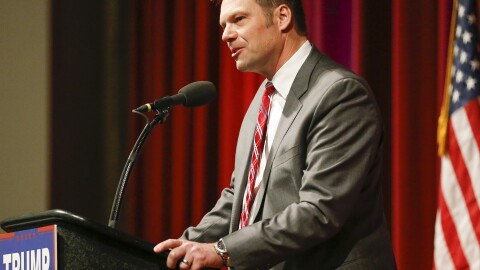At the Abubakar Assidiq Islamic Center on the Columbus's West Side, over a hundred people from around the city gathered for Friday afternoon prayers. The themes of the sermon? Communication between parents and their children, and the issues of radicalization and Islamophobia.
About fifty women gather on the floor of the women's prayer hall, while their young children run across the red carpeting. The men gather on the other side, separated by a wall with glass windows. The sermon is projected over speakers and on large television screens.
Horsed Noah, the center's director, gives the sermon in both English and Somali.
"Where regardless of the efforts of the Islamic centers, our children can still be radicalized in their bedrooms."

Once the sermon is over, the women gather at the front of the room. They stand together in rows, their headscarves an array of colors, and they begin to pray.
Noah says he often brings up the issue of radicalization in his sermons.
"But I felt I kind of stressed upon it today because of the recent tragedy," Noah said.
While the FBI has not said whether they've found ties between terrorist organizations and Abdul Razar Ali Artan—the young man who carried out Monday's attack on the Ohio State campus—they do believe he was influenced by radical ideology.
Islamophobia is also central to Noah's sermons.
Noah says each Friday he requests a member of local law enforcement keep watch outside the center, but today he's requested multiple officers. Despite the heightened sense of fear since Monday's attack, he wants members of his community to keep their faith.
"But the level of goodness and beauty that's here is far more greater than the Islamophobia they are facing today," Noah said.

Over the weekend the center will hold two programs, with one called "Know Your Rights" that teaches people about how to report incidents at work or school. The second program will teach parents about the connections between mental illness and radicalizations.
"Whenever something like this happens, it's either a mental illness or someone who was radicalized," he said.
Fatima Omar is one of a number of young women who attended Friday's sermon. A social work major at Ohio State University, she says this week she's felt safe and respected on campus. As a woman, though, Omar says she knows her and her friends can be easily targeted.
"You can see that we're actual Muslims because of what we are wearing," Omar said.
Fardawsa Muhamed, a student at the Columbus Community College, says teachers and her fellow students have all been supportive.
"Even our classes are holding discussions about the event," Muhamed says. "However, on social media I think it's a bit different. We do have very ignorant people on there that make very ignorant comments and statement."
Omar and Muhamed agree that as Somali Muslims, there's one question they're tired of hearing.
"It's not fair to question us on other people's actions, which we're not associated with," Omar says.
Abdul Razak Ali Artan was also Somali and Muslim. Muhamed says that doesn't mean they should be expected to explain his actions.
"The world tends to make the Muslim community apologize, or condemn it in a way like it's our responsibility," Muhamed says.
The women are planning an event next weekend called "Meet a Muslim" where people from the larger community can come to ask them questions—instead of making assumptions.




